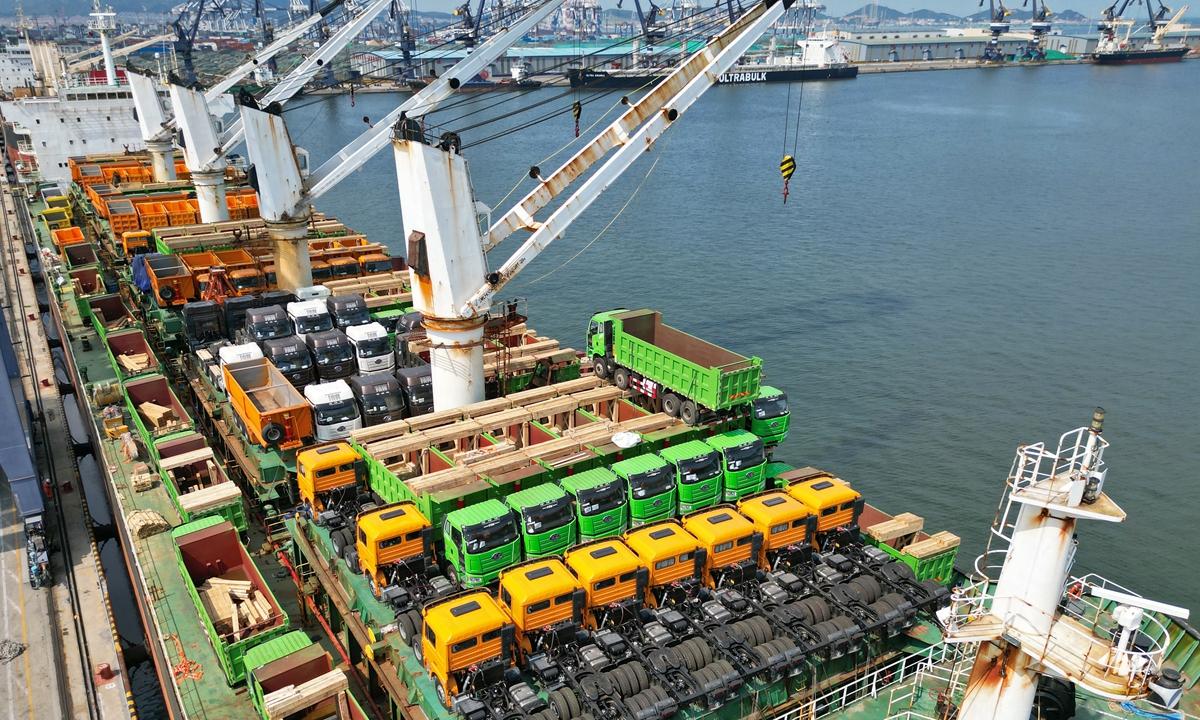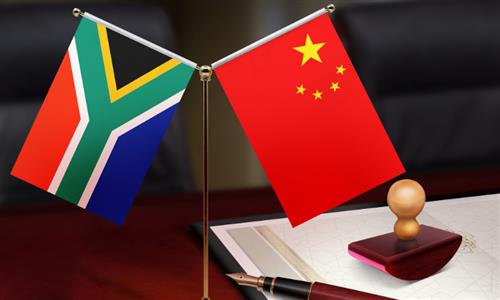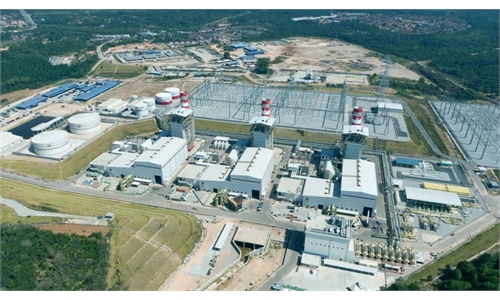China-Africa trade cooperation yields notable results as BRI marks 10th anniversary
Opportunities covering digital economy, green devt expected to boost bilateral ties to a higher level

Engineering vehicles ready to export to Africa wait at Yantai Port, East China's Shandong Province on July 17, 2022. China's auto exports exceeded two million units for the first time in 2021, becoming the third-largest auto exporter after Germany and Japan. In the first five months this year, China exported 1.08 million units. Photo: VCG
This year marks the 10th anniversary of the Belt and Road Initiative (BRI) and also the 10th anniversary of the principles of sincerity, real results, amity and good faith, and of pursuing the greater good and shared interests in developing China's relations with Africa put forth by Chinese President Xi Jinping. Thanks to the strategic guidance of the leaders of China and African countries, China-Africa relations have been growing with the "acceleration button" on, and entered a fast track toward a new era of a stronger China-Africa community with a shared future.
During President Xi's state visit to South Africa, one of the largest economies in the continent, on Tuesday, China and South Africa reached a series of agreements. The two sides agreed that since its inception 10 years ago, the BRI is a useful, mutually beneficial platform for international cooperation. The two sides will consider working toward bilateral cooperation and synergy within the BRI and the Economic Reconstruction and Recovery Plan (ERRP) frameworks.
In the post-COVID-19 era, robust China-Africa economic cooperation will be elevated to a higher level, ushering in more cooperation and development opportunities, Chinese observers said, noting that there is great potential for both sides to deepen partnership in key areas such as infrastructure, logistics, trade and investment, manufacturing and the digital economy to provide more opportunities for Africa's development.
Fruitful outcomes
China has been Africa's largest trading partner for 14 consecutive years, and the areas of cooperation between the two sides have been extended to digital technology, green economy, aerospace, finance and other emerging sectors.
Chinese companies are actively taking part in Africa's infrastructure, industrialization and agricultural development, which helps promote rapid development of industries, e-commerce, mobile payment and other industries on the continent.
The Chinese-built Addis Ababa-Djibouti railway, a landmark rail line connecting Ethiopia and Djibouti, is a flagship project under the BRI framework. The rail line has operated over 1,800 passenger trains carrying nearly 530,900 passengers during its five and half years of operation, the Xinhua News Agency reported in July, citing the Ethiopian Minister of Transport and Logistics.
"Compared with other countries, the China-proposed BRI accommodates the interests and concerns of all parties involved, and seeks a conjunction of interests and the 'biggest common denominator' for cooperation. For example, the Addis Ababa-Djibouti railway helps landlocked Ethiopia access maritime trade ports while injecting strong momentum to the logistical development in Djibouti's ports," China Civil Engineering Construction Corporation (CCECC), a main contractor of the railway, said in a statement sent to the Global Times.
In boosting the construction of infrastructure projects, Chinese enterprises fully consider and take care of African countries' interests, and conduct pragmatic cooperation with African countries in important livelihood sectors including railways, roads and water conservancy so as to ensure these infrastructure achievements benefit more regions, the company said.
"Without the infrastructures and the extensive digital infrastructure, we can't compete in the global economy. A huge benefit [that the BRI brings] for us is that we can trade with each other through the infrastructures connecting the cities and countries," South African Ambassador to China Siyabonga Cyprian Cwele told the Global Times in an exclusive interview in July.
During Xi's visit, China and South Africa reached cooperation agreements covering various sectors such as electricity, sci-tech innovations, investment and industrial parks.
China and Africa proposed nine programs at the Eighth Ministerial Conference of the Forum on China-Africa Cooperation in November 2021, guiding bilateral economic and trade cooperation to a higher level.
The nine programs have each yielded fruitful results, Li Fei, China's Vice Minister of China's Ministry of Commerce, told reporters in June. Under the trade promotion program, for example, 21 African countries now receive zero-tariff treatment for 98 percent of their exports to China. In 2022, Chinese projects in Africa created 300,000 jobs for local workers, Li said.
As the old saying goes, "give a man a fish and you feed him for a day. Teach a man how to fish and you feed him for a lifetime." China is also making efforts to improve the professional skills of the local workforce so as to inject vitality to the sustainable development of African economies.
Since the establishment of the first Luban Workshop, a China-supported skill and vocational training project, in Djibouti in March 2019, China has built more than 10 Luban Workshops in African countries including Egypt and Kenya to provide vocational training courses to African youth, as part of efforts to deepen pragmatic cooperation with Africa and support local economic and social development.
Vibrant trade relations
As this year marks the 10th anniversary of the BRI, the third China-Africa Economic and Trade Expo was held between June 29 and July 2, in Changsha, Central China's Hunan Province, also garnered widespread attention. All 53 African countries which have diplomatic ties with China attended the expo, while the number of African exhibits produced historic highs.
At the expo, China's General Administration of Customs released for the first time China-Africa Trade Index, based on trade-indicator data between China and African countries. The index shows strong growth in trade over the past two decades and indicates that trade between China and Africa has become increasingly close, with trade potential continuing to grow.
Between 2000 and 2022, the import and export value between China and Africa grew more than 20-fold to hit 1.88 trillion yuan ($261.16 billion) from less than 100 billion yuan, at an average annual growth of 17.7 percent.
In the first seven months of 2023, China's exports to Africa surged by 20 percent to reach 709.6 billion yuan, with the export of vessels, autos and labor-intensive products taking the lead, recent GAC showed.
"China-Africa economic and trade relationship serves as a stabilizer for the global economy. Africa is able to provide a large market and natural resources, while China is a committed development partner and provides capital and technologies to boost the continent's development," Song Wei, a professor at the School of International Relations and Diplomacy at Beijing Foreign Studies University, told the Global Times.
China has inked BRI cooperation documents with 52 African countries and the African Union Commission, and established multiple special work groups focusing on promoting unimpeded trade, investment cooperation, capacity cooperation, e-commerce and other fields, Li said.
Under the BRI framework, there is vast room for China and Africa to deepen their economic cooperation in sectors including the digital economy, green development and finance in addition to agriculture and infrastructure. This will provide more opportunities for Africa's development and help address bottlenecks in the continent's development and accelerate internal momentum, Song said.
"Amid multiple global challenges including the impact of the COVID-19, mounting geopolitical tensions and protectionism, it's more important than ever for China and Africa deepen cooperation," Song said, noting that China will continue to step up investment in the continent to help diversify African countries' economy and boost their industrialization so that they could realize self-reliance and sustainable development.


